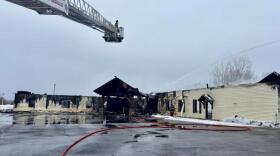As this seemingly never-ending winter of record cold temperatures and stubborn snowstorms drags on in central New York, it seems hard to believe that a new season is around the corner. But, spring is lurking beneath the snow pack.
February was the coldest month on record in Syracuse, with an average temperature of just 9 degrees. That broke the previous record of 12.1 degrees set in February 1934. All the bulbs and seeds of the spring flowers buried under upstate New York’s frozen tundra are probably taking the record cold temperatures better than humans above ground, says SUNY ESF professor of landscape architecture Tim Toland.
"The fact that we’ve had a lot of snow is good in some respect, especially for the shorter plants, because it will insulate them,” said Toland. “And if the plants have been underneath this continual blanket of snow, they haven’t been affected by the extreme bitterness and the extreme wind.”
Toland says hardiness and location is key to survival of above-ground plants. The problem there says Don Leopold, chairman of the SUNY ESF environmental and forest biology department, is that more plants suited to warmer climes have made it into our landscapes, because climate change has led some national groups to change horticultural zones that designate which plants should grow in what weather conditions.
“You might have an average that is warmer but we’re getting these more extreme periods, so a lot of people pushing those zone six plants in upstate New York, unless they’re highly protected, they probably lost them this year.”
If anything, Toland says the extremes this winter are a lesson for the future, when homeowners and landscapers start thinking about planting in the coming season.
“There was talk of being able to plant camellias, and azaleas and things like that. And you know, we look at hardiness zone as an average, and there’s always an extreme. And we’ll get those extremes, we have had those extremes that push us into the zone four type of winter.”








